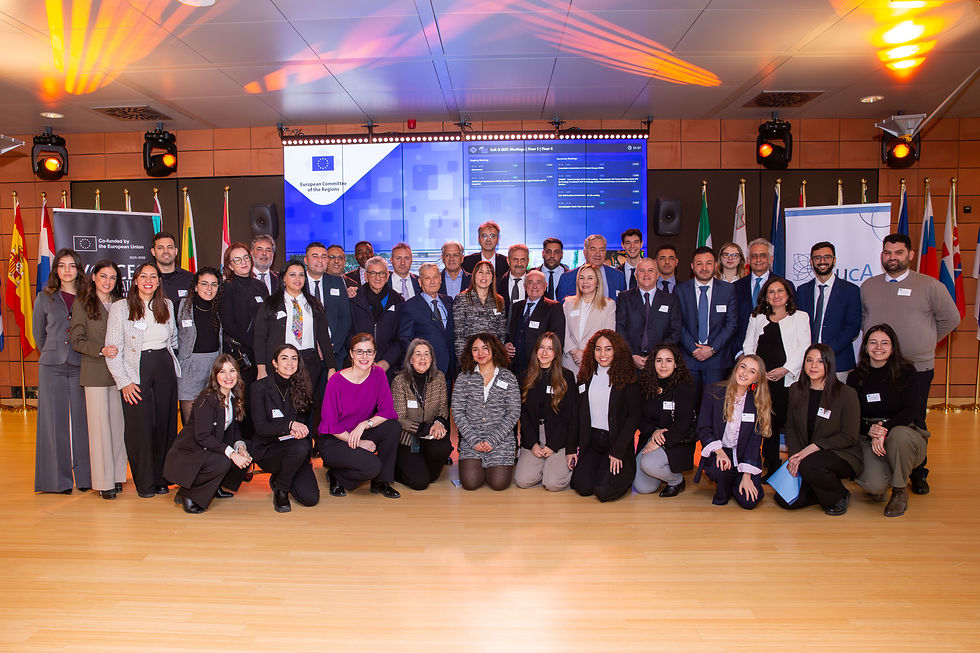VOICES From Migrations | Berenice Franca's story
- Changemakers
- Jun 27, 2025
- 3 min read
Updated: Aug 12, 2025
“VOICES From Migrations” is a project co-financed by the European Union that gives voice to the untold migration stories. Berenice Franca moved from Italy to Belgium, where she worked as Vice-Consul. This is her story.

“My name is Berenice Franca Vilardo. I am Italian, born in Calabria, although I have never lived there. As a child, I moved to Rome with my family, because my father worked at the Ministry of Foreign Affairs. Even though I had a degree to become a teacher, I wanted to take the exam at the Ministry of Foreign Affairs, and so I took another path. However, I am happy about it, because it has been a very interesting life, full of novelties, of knowledge.
I have been here in Brussels since 1994, where I asked to stay until I retired in 2003. I was vice consul in Brussels and then consul in Charleroi. Here I learned about local things but also the most interesting thing for me: the presence of Italians in Belgium.
In 1996 we did a survey: Brussels had 85,000 Italians, Liège almost 100,000, Charleroi almost 200,000, also because of the mines. I was welcomed very well by the local population, even if for our Italian miners, that was not that was the case. They found written on the doors “renting to dogs and Italians is prohibited” and it is something that still moves me, because I knew almost all of them: they often came to the consulate. They were an important presence, even though they were the last in the working class. I met many migrants, simple but strong people, who despite prejudices and difficulties, managed to integrate without losing their identity.
Despite my retirement, I continue to work to promote my land here in Brussels. I spend part of the year between Rome and Calabria, where I have a house. My Calabrian roots are strong: the values of my land are unique and I carry them with pride everywhere.
What am I most proud of today? Of being Italian.”
Interview by: Beatrice Rivadossi, Giuseppe Bellassai, Karolina Skalska, Botond Diveki
Original story in Italian: “Mi chiamo Berenice Franca Vilardo. Sono italiana, nata in Calabria, anche se non ci ho mai vissuto. Da bambina mi sono trasferita a Roma con la mia famiglia, perché mio padre lavorava al Ministero degli Esteri. Anche se avevo una laurea per fare l’insegnante, ho voluto fare il concorso al Ministero degli Esteri e quindi ho preso un’altra strada. Però ne sono contenta, perché è stata una vita molto interessante, piena di novità, di conoscenze.
Sono qui a Bruxelles dal ‘94, dove ho chiesto di restare fino alla pensione nel 2003. Sono stata vice console a Bruxelles e poi console a Charleroi. Qui ho appreso quello che è locale ma anche la cosa più interessante per me: la presenza dgli italiani in Belgio.
Nel 1996 facemmo un’indagine: Bruxelles aveva 85.000 italiani, Liegi quasi 100.000, Charleroi quasi 200.000, anche per via delle miniere. Dalla popolazione locale io sono stata accolta benissimo, anche se per i nostri minatori italiani non è stato così. Hanno trovato scritto sulle porte “vietato affittare ai cani e agli italiani” ed è una cosa che a me ancora commuove, perché li conoscevo quasi tutti: spesso venivano in consolato. Erano una presenza importante, nonostante fossero gli ultimi della società lavorativa. Ho conosciuto tanti emigrati, persone semplici ma forti, che nonostante pregiudizi e difficoltà, sono riuscite a integrarsi senza perdere la loro identità.
Nonostante la pensione, continuo a impegnarmi per promuovere la mia terra qui a Bruxelles. Passo parte dell’anno tra Roma e la Calabria, dove ho casa. Le mie radici calabresi sono forti: i valori della mia terra sono unici e li porto con orgoglio ovunque.
Di cosa sono più orgogliosa oggi? Di essere italiana.”
Intervista di: Beatrice Rivadossi, Giuseppe Bellassai, Karolina Skalska, Botond Diveki
Read the article in My House of European History:

Funded by the European Union. Views and opinions expressed are however those of the author(s) only and do not necessarily reflect those of the European Union or the European Education and Culture Executive Agency (EACEA). Neither the European Union nor EACEA can be held responsible for them.



Comments